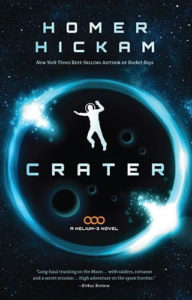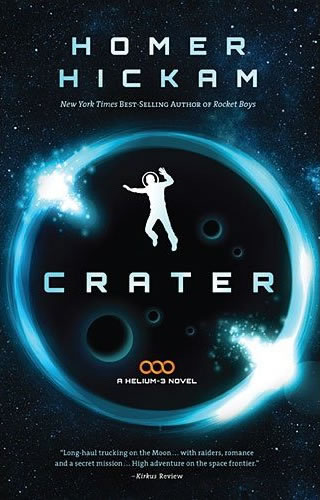The Wild West Comes To The Moon In ‘Crater’
 If space is the final frontier, then the moon is the site of the next gold rush. Homer Hickam’s novel Crater is set on our beloved satellite where mini-dictators play by their own rules and where someone making a fresh start can find escape. The scene is complete with horses wearing spacesuits, genetically-manipulated mercenaries, and clumps of slime mold that can hack computers.
If space is the final frontier, then the moon is the site of the next gold rush. Homer Hickam’s novel Crater is set on our beloved satellite where mini-dictators play by their own rules and where someone making a fresh start can find escape. The scene is complete with horses wearing spacesuits, genetically-manipulated mercenaries, and clumps of slime mold that can hack computers.
Sixteen-year-old Crater Trueblood likes his home on the moon. He loves his adoptive mother Q-Bess (the rightful queen of England on the lam) and her son Petro, a semi-honest opportunist. He’s even content with the dangerous work of mining Helium-3, the newest power source that’s keeping Earth running. But when he catches the eye of Moontown’s governor—and the governor’s daughter—he receives a dangerous mission: trek across the moon to pick up a package from Earth that could change everything.
Crater is brilliant—and everyone knows it but him. He can fix any machine and speaks multiple languages, but he usually assumes the best about people, giving him a naivete unique to moon-dwellers. He plays fair every single time, concocts impossible schemes to fulfill his mission, and is tenacious enough to succeed.
Hickam is heavy on adventure and light on preaching. He portrays a society where miners blurt a quick prayer for safety before heading to work but do little else to express faith in God. In fact, God is hardly mentioned in the book. But it’s easy to see that Crater operates with a different mindset than everyone else.
Many of the details and circumstances reflect Hickam’s careful research about the moon’s geology. Helium-3 exists and could be the fuel of the future. The final result is more than a novel; it’s a description of what life could look like in a hundred years. Thinking in this way slightly improves the long descriptive passages.
The roughest element in the book might be Hickam’s omniscient perspective. The narrator might be detailing Crater’s thoughts and feelings one moment, but two paragraphs later, the view shifts to that of a minor character. This can be jarring, but after a while it’s easier to ignore.
This teen novel is light enough on language and violence for younger readers but delves into the complicated politics of a whole new story world. The ending is simultaneously predictable and unexpected, satisfying and unresolved. Crater matures a lot, but never loses heart or guts. He never looks for trouble, but it always finds him.
The adventures continue in Crescent, released in 2013.






































When I read this, I found the plot a little slow, but the world-building was good.
I agree that the book wasn’t plot-driven, but I’m usually okay with that if the world and characters are interesting enough. It reminds me of the “bildungsroman” genre, which are coming of age stories like Huckleberry Finn. A similar sci-fi novel is 7th Sigma by Steven Gould.